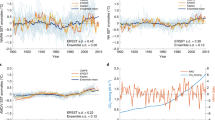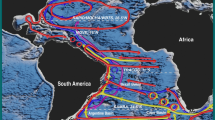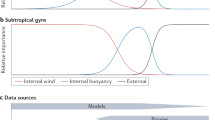Abstract
The Atlantic Meridional Overturning Circulation (AMOC)—one of Earth’s major ocean circulation systems—redistributes heat on our planet and has a major impact on climate. Here, we compare a variety of published proxy records to reconstruct the evolution of the AMOC since about ad 400. A fairly consistent picture of the AMOC emerges: after a long and relatively stable period, there was an initial weakening starting in the nineteenth century, followed by a second, more rapid, decline in the mid-twentieth century, leading to the weakest state of the AMOC occurring in recent decades.
This is a preview of subscription content, access via your institution
Access options
Access Nature and 54 other Nature Portfolio journals
Get Nature+, our best-value online-access subscription
$29.99 / 30 days
cancel any time
Subscribe to this journal
Receive 12 print issues and online access
$259.00 per year
only $21.58 per issue
Buy this article
- Purchase on Springer Link
- Instant access to full article PDF
Prices may be subject to local taxes which are calculated during checkout

Similar content being viewed by others
Data availability
The proxy datasets that are analysed in this study are available in a GitHub repository: https://github.com/ncahill89/AMOC-Analysis.
Code availability
The scripts for the change point and the significance testing are available in a GitHub repository: https://github.com/ncahill89/AMOC-Analysis.
References
Rahmstorf, S. Ocean circulation and climate during the past 120,000 years. Nature 419, 207–214 (2002).
Caesar, L., Rahmstorf, S., Robinson, A., Feulner, G. & Saba, V. Observed fingerprint of a weakening Atlantic Ocean overturning circulation. Nature 556, 191–196 (2018).
Thornalley, D. J. R. et al. Anomalously weak Labrador Sea convection and Atlantic overturning during the past 150 years. Nature 556, 227–230 (2018).
Smeed, D. A. et al. The North Atlantic Ocean is in a state of reduced overturning. Geophys. Res. Lett. 45, 1527–1533 (2018).
Rahmstorf, S. et al. Exceptional twentieth-century slowdown in Atlantic Ocean overturning circulation. Nat. Clim. Change 5, 475–480 (2015).
Sherwood, O. A., Lehmann, M. F., Schubert, C. J., Scott, D. B. & McCarthy, M. D. Nutrient regime shift in the western North Atlantic indicated by compound-specific delta15N of deep-sea gorgonian corals. Proc. Natl Acad. Sci. USA 108, 1011–1015 (2011).
Thibodeau, B. et al. Last century warming over the Canadian Atlantic shelves linked to weak Atlantic Meridional Overturning Circulation. Geophys. Res. Lett. 45, 12376–12385 (2018).
Cheng, L. et al. Improved estimates of ocean heat content from 1960 to 2015. Sci. Adv. 3, e1601545 (2017).
Osman, M. B. et al. Industrial-era decline in subarctic Atlantic productivity. Nature 569, 551–55 (2019).
Spooner, P. T. et al. Exceptional 20th century ocean circulation in the Northeast Atlantic. Geophys. Res. Lett. 47, e2020GL087577 (2020).
Mann, M. E. et al. Proxy-based reconstructions of hemispheric and global surface temperature variations over the past two millennia. Proc. Natl Acad. Sci. USA 105, 13252–13257 (2008).
Keil, P. et al. Multiple drivers of the North Atlantic warming hole. Nat. Clim. Change 10, 667–671 (2020).
Zhang, R. et al. A review of the role of the Atlantic Meridional Overturning Circulation in Atlantic multidecadal variability and associated climate impacts. Rev. Geophys. 57, 316–375 (2019).
Acknowledgements
L.C., N.C. and G.D.McC. are supported by the A4 project. A4 (Grant-Aid Agreement no. PBA/CC/18/01) is carried out with the support of the Marine Institute under the Marine Research Programme funded by the Irish Government, co-financed by the European Regional Development Fund. D.J.R.T. is supported by UK NERC grant NE/S009736/1.
Author information
Authors and Affiliations
Contributions
S.R. initiated the study. L.C. created the figure and wrote the manuscript. N.C. performed the significance testing. All authors discussed and interpreted the results and provided input to the manuscript.
Corresponding author
Ethics declarations
Competing interests
The authors declare no competing interests.
Additional information
Peer review information Nature Geoscience thanks the anonymous reviewers for their contribution to the peer review of this work. Primary Handling Editor: James Super.
Publisher’s note Springer Nature remains neutral with regard to jurisdictional claims in published maps and institutional affiliations.
Rights and permissions
About this article
Cite this article
Caesar, L., McCarthy, G.D., Thornalley, D.J.R. et al. Current Atlantic Meridional Overturning Circulation weakest in last millennium. Nat. Geosci. 14, 118–120 (2021). https://doi.org/10.1038/s41561-021-00699-z
Received:
Accepted:
Published:
Issue Date:
DOI: https://doi.org/10.1038/s41561-021-00699-z
This article is cited by
-
Impact of industrial versus biomass burning aerosols on the Atlantic Meridional Overturning Circulation
npj Climate and Atmospheric Science (2024)
-
Orbitally forced and internal changes in West African rainfall interannual-to-decadal variability for the last 6000 years
Climate Dynamics (2024)
-
Uncertainties in critical slowing down indicators of observation-based fingerprints of the Atlantic Overturning Circulation
Nature Communications (2023)
-
Weakened AMOC related to cooling and atmospheric circulation shifts in the last interglacial Eastern Mediterranean
Nature Communications (2023)
-
Projected Atlantic overturning slow-down is to be compensated by a strengthened South Atlantic subtropical gyre
Communications Earth & Environment (2023)



